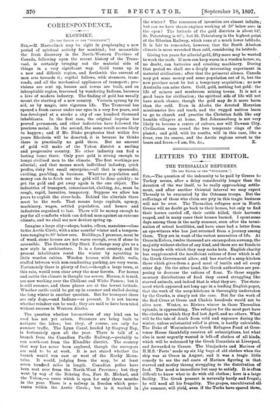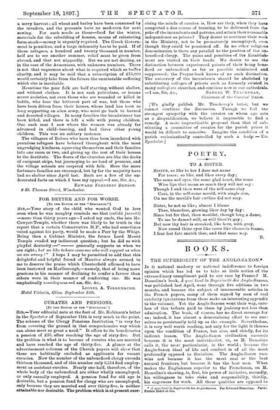LETTERS TO THE EDITOR.
THE THESSILIAN REFUGEES.
(To THE EDITOR OF THE " SPECTATOR:1
SIE,—The question of the indemnity to be paid by Greece to Turkey seems, after a delay considerably longer than the duration of the war itself, to be really approaching settle- ment, and after another Oriental interval we may expect Thessaly to be evacuated by the Ottoman troops. But the. sufferings of those who claim our pity in this tragic business will not be over. The Thesealian refugees now in North Greece will no doubt go back to their homes, but only to find their horses carried off, their cattle killed, their harvests reaped, and in many cases their houses burned. I spent some days among them in the early summer, soon after the termi- nation of actual hostilities, and have since had a letter from an eye-witness who has just returned from a journey among them. They are in want of the veriest necessities of life. At Oreos inEubces, twelve thousand are encamped on a swamp, the majority without shelter of any kind, and there are no funds to- buy boards with which they may make huts. English charity has supplemented the insufficient rations of flour which is all the Greek Government allow, and has started a soup-kitchen there which gives them a good meal of lentils and oil every other day. On the other hand, the Greek authorities are pro-- posing to decrease the rations of flour. To these supple- mentary distributions of food they crowd struggling like starved animals, and indeed that is what they are. The state- ment which appeared not long ago in a leading English paper, that the work of the soup-kitchens is thoroughly undertaken by the Greeks, is simply not the case. But for the work of the Red Cross at Oreos and Chalcis hundreds would not be alive now. Winter, no Riviera winter in those Thessalian uplands, is approaching. The refugees for the most part have- the clothes in which they fled last April, and no others. What will be the tale of death from cold and exposure during the- winter, unless substantial relief is given, is hardly calculable. The Duke of Westminster's Greek Refugees Fund at Gros- venor House thankfully receives all subscriptions, but what. also is most urgently wanted is left-off clothes of all kinds, which will be welcomed by the Greek Consulate at Liverpool, and forwarded to Greece. The bluejackets and Marines of H.M.S. • Forte' made up six big bags of old clothes when the ship was at Oreos in August, and it was a tragic little comedy to see the red coats of Marines figuring in that, starved and motley throng struggling to the distribution of food. The need is immediate but easy to satisfy. It is often difficult to know what to do with old clothes ; here is a large' facility. The Greek peasant is naturally hardy and frugal; he will need all his frugality. The grapes, uncultivated all the summer, will yield, even if the Turks have spared thon,. a sorry harvest ; all wheat and barley have been consumed by the invaders, and the peasants have no seed-corn for next sowing. For such needs as these—food for the winter, materials for the rebuilding of houses, means of reinstating farm-stock—money is urgently required. The Greek Govern- ment is penniless, and a large indemnity has to be paid. if of these refugees, a hundred and twenty thousand in number, half are to see another summer, relief must be given from abroad, and that not niggardly. But we are not dealing, as in the case of the Armenians, with unknown numbers. There is not that vagueness about what is required which so baffles charity, and it may be said that a subscription of 215,000 would certainly take from the future the unutterable suffering which else is inevitable.
Meantime the poor folk are half starving, without shelter, and without clothes. It is not rash politicians, or insane secret societies, not even those who are wounded or killed in battle, who bear the bitterest part of war, but those who have been driven from their homes, whose land has been so long supporting an alien army, who must go back to burned and deserted villages. In many families the breadwinner has been killed, and there is left a wife with young children. One such case I saw where the woman was already far advanced in child-bearing, and had three other young -children. This was no solitary instance.
The villagers of Eabrea who have thus been inundated with penniless refugees have behaved throughout with the most ungrudging kindness, squeezing themselves and their families into one room or two, and giving up the rest of their houses to the destitute. The floors of the churches are like the decks of emigrant ships, but journeying to no land of promise, and the village schools are carpeted with folk. Here the more fortunate families are encamped, but by far the majority have had no shelter since April last. Such are a few of the un- decorated facts on which I base my appeal.—I am, Sir, &c., EDWARD FREDERIC BENSON.
9 St. Thomas Street, Winchester.



































 Previous page
Previous page